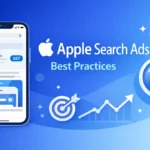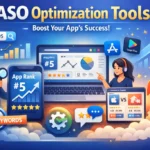How to Conduct a Complete ASO Audit?

Due to the high competition in the app stores, it has become difficult for app developers to rank their apps in the search results and to reach more potential users. Even though there is spending so much in developing the apps, without the proper visibility in search results it has become challenging for the markers and developers to increase their visibility. As a solution, App Store Optimization (ASO) comes into play to optimize the apps for better ranking, visibility, organic installs and to reach more potential users. In this article, there will be a step-by-step process for conducting a complete ASO audit to enhance your app visibility and engagement.
Introduction
In today’s highly competitive app market, ASO has emerged as a crucial strategy to ensure your app gets discovered by the right audience. By aligning your app’s metadata with user search behavior, you can significantly increase organic downloads and user engagement.
Understanding the Importance of ASO
App Store Optimization is the process of optimizing various elements of your app’s listing to improve its visibility in app stores. Just like websites rely on SEO, apps require ASO to enhance their discoverability. A well-executed ASO strategy can lead to higher conversion rates and increased brand credibility.
Preparing for the ASO Audit
Defining Your Target Audience
Before diving into the ASO audit, it’s essential to identify your target audience. Who are your ideal users? What are their preferences and pain points? Understanding your audience helps tailor your app’s content to their needs.
Analyzing Competitors
Analyze your competitors’ apps to identify their strengths and weaknesses. This analysis can provide insights into effective keywords, successful visuals, and unique selling points that you can leverage for your app.
Keyword Research
Thorough keyword research is at the heart of ASO. Identify relevant keywords that your target audience is likely to use when searching for apps similar to yours. Tools like Google Keyword Planner and app-specific platforms can assist in this research.
Optimizing App Title and Description
Crafting an Appealing App Title
Your app’s title should be concise, memorable, and reflective of its purpose. Incorporate relevant keywords naturally to improve your app’s chances of appearing in relevant searches.
Writing a Compelling Description
The app description is your opportunity to showcase your app’s features and benefits. Use persuasive language to highlight what makes your app unique and valuable to users.
Effective Use of Keywords
Strategically integrate keywords in the title and description to improve your app’s visibility. However, avoid keyword stuffing, as it can hurt user experience and search rankings.
Captivating App Icon and Screenshots
Designing an Eye-Catching App Icon
The app icon is the first visual impression that users get when searching for any specific app. Designing visually appealing icons can increase app conversion.
Showcasing the App through Screenshots
App screenshots should visually represent your app’s functionalities and features. It makes sure that all screenshots should be in high quality and accurately depict the user experience.
Enhancing App Localization
Adapting to Different Markets
App localization is also one of the best sources of organic results to increase app visibility and traffic. Localize your app for different languages which significantly will increase the user base.
Translating Keywords and Descriptions
When localizing, don’t forget to translate your keywords and descriptions accurately. Using the right keywords in the local language can boost your app’s visibility in specific regions.
Monitoring and Analyzing User Reviews
Responding to User Feedback
Engage with your users by responding to their reviews, both positive and negative. Show users that you value their feedback and are committed to improving their experience.
Addressing Negative Reviews
Sometimes negative reviews are an opportunity for improvement. Address the issues mentioned by users and communicate the steps you’re taking to resolve them.
Optimizing App Updates
Regularly Updating Content
Making the app updates keeps the users more excited and relevant to your app. Regularly introduce the new features, fix the bugs and errors, and make enhancements to show that your app is actively maintained.
Keeping Up with Trends
Keeping up with trends, industry demands, and user requirements. It will need to incorporate the popular features and functionalities to ensure that your app remains competitive.
Leveraging Social Proof and Awards
Showcasing Awards and Recognitions
If your application has been honored with an award, then prominently display them in your listing. This will be the social evidence and build confidence for the potential users.
Encouraging User Ratings and Reviews
Encourage users to share their positive reviews and provide ratings. Higher ratings and reviews will encourage new users to install the app.
Tracking and Measuring Performance
Using Analytics Tools
App downloads, user engagement, and conversion rates are important metrics to analyze by using the analytic tools. On the basis of these analytic tools, it will need to take the next step for ASO strategy to improve the KPIs.
Monitoring Keyword Rankings
Regularly monitor your app’s keyword rankings in app store searches. Adjust your strategy as needed to maintain or improve your app’s position.
Final Thoughts
A thorough ASO audit is important to increase the app’s visibility, ranking, conversion, and downloads organically. By Optimizing the various aspects of the ASO checklist, we can easily increase the app’s visibility, ranking, and downloads in this competitive market.
ASO is the organic process of optimizing the app listing for better visibility and to drive more app downloads. It is important to reach more potential users and to increase the app’s visibility and engagement.
Keyword selection is very important in the app optimization process. Use the keyword research tools to identify the more relevant keywords and analyze the search volume and competition.
Yes, it is necessary to show that you value the user feedback and are committed to improving your app.
Yes, you can update your app’s metadata after publishing it on the store. Regularly reviewing and updating your keywords and description can improve your app’s visibility.




